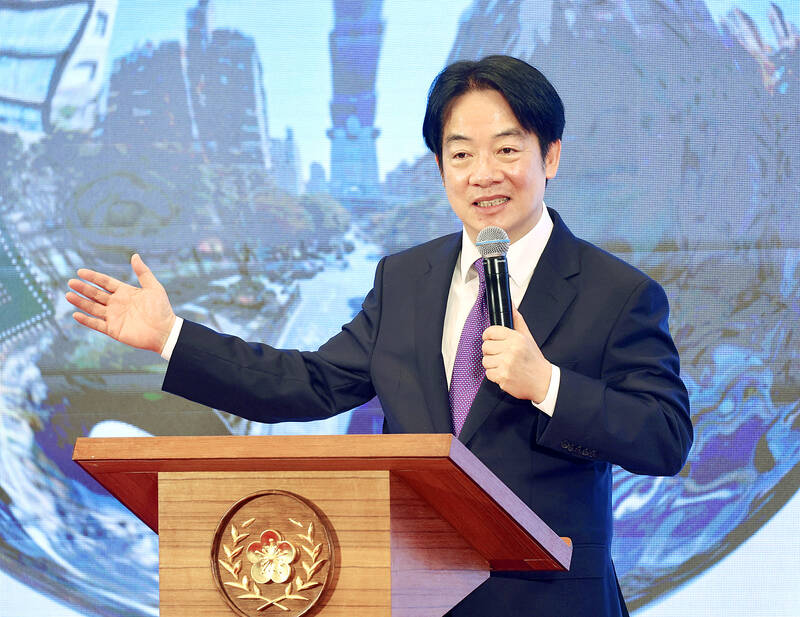Japan and other regional partners should work together to counter Chinese military coercion and build a “non-red” supply chain, President William Lai (賴清德) said in an interview published by Nikkei Asia yesterday.
As Lai approaches one year in office, he granted his first foreign media interview this year to the Japan-based publication to discuss Taiwan’s relations with Japan, China and the US, as well as the semiconductor industry, and the international economic and trade landscape.
Amid US President Donald Trump’s proposed tariffs and escalating Chinese military exercises around Taiwan, Lai said that “Japan is a powerful nation. I sincerely hope that Japan can take a leading role amid these changes in the international landscape.”

President William Lai speaks at an event for the Taiwan Global Pathfinders Initiative in Taipei yesterday.
Photo: CNA
“At this moment, the Indo-Pacific and international community really need Japan’s leadership,” he said.
Taiwan hopes to work with Japan on democracy and peace, innovation and prosperity, and justice and sustainability, as the two share “deep historical bonds,” he added.
He also thanked the Japanese government, legislature, society and public for their longstanding support for Taiwan.
Regarding intensified Chinese military drills, espionage and “united front” infiltration, Lai said that “to defend democracy and sovereignty, protect our free and democratic system, and ensure the safety of our people’s lives and property, Taiwan’s choice is clear.”
Japan also “has no other choice” as a democratic nation, he said.
“When China expanded its military presence in the East China Sea and South China Sea, the international community did not stop it; when China conducted exercises in the Taiwan Strait, the international community did not take strong measures to prevent this from happening,” Lai said.
Lai called for Taiwan, Japan, the Philippines and the US to show unity and face China’s military intimidation head-on, in light of “gray zone” exercises in the Taiwan Strait, the South China Sea and the East China Sea.
“If no action is taken now, the situation may become increasingly serious,” potentially shifting from a military exercise to combat, he said.
Taiwan “must demonstrate the strength of deterrence to prevent China from making the wrong judgement,” Lai said.
“As long as China treats Taiwan with parity and dignity, Taiwan is willing to conduct exchanges and cooperate with China, and seek cross-strait peace and mutual prosperity,” Lai said.
Lai said that he hopes Japan would sign an economic partnership agreement with Taiwan and support Taiwan’s accession to the Comprehensive and Progressive Agreement for Trans-Pacific Partnership trade pact.
Taiwan also hopes to incorporate Japan into its plans to leverage production and manufacturing capabilities to establish a “non-red” global semiconductor supply chain for democratic nations, he said, meaning a supply chain independent from China.
“Japan has materials, equipment and technology, the US has IC [integrated circuit] design and marketing, Taiwan has production and manufacturing, and the Netherlands excels in equipment,” he said.
The goal is to root local industries in Taiwan while expanding the nation’s global presence, Lai said, adding that in light of US tariff talks, the government does not want to “put all [its] eggs in one basket.”
“While we see the current ‘reciprocal’ tariffs imposed by the US as a kind of challenge, we also view these changes positively,” he said.
Taiwan hopes to ensure long-term development by supporting “US reindustrialization and its aim to become a world AI [artificial intelligence] hub through investment, while simultaneously upgrading and transforming Taiwan’s industries,” Lai said.
“Over the past few decades, the free economy headed by the Western world and led by the United States has brought economic prosperity and political stability” to Taiwan, he said, adding that Japan and Taiwan have been “exemplary students,” more than can be said of other nations.
China is the “biggest crisis” to the free-trade system due to plagiarism, counterfeiting, dumping and intellectual property disputes, he said.
“If this kind of unfair trade is not resolved, the stable societies and economic prosperity we have painstakingly built over decades, as well as some of the values we pursue, could be destroyed,” Lai said.
The US has recently addressed such unfair trade practices and Taiwan would be willing to help, he said.
Asked if Taiwan Semiconductor Manufacturing Co (TSMC, 台積電) building fabs overseas would weaken Taiwan’s security, Lai said that the world cares about stability in the Taiwan Strait, because it is key to curbing China’s expansionist ambitions.
“That is the reason, and it has no direct connection with TSMC. After all, TSMC has not made investments in that many countries. That point, I think, is clear,” Lai said, calling the company’s investments in the US, Japan and Europe “natural” and “normal.”
Source: Taipei Times - 2025/05/14




















